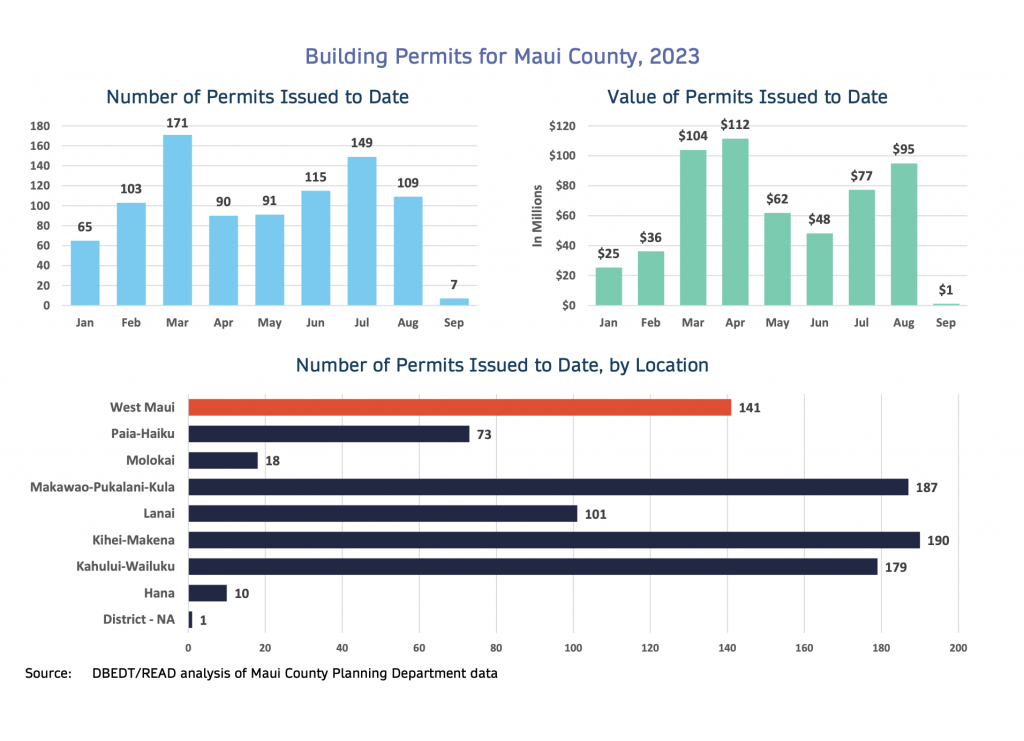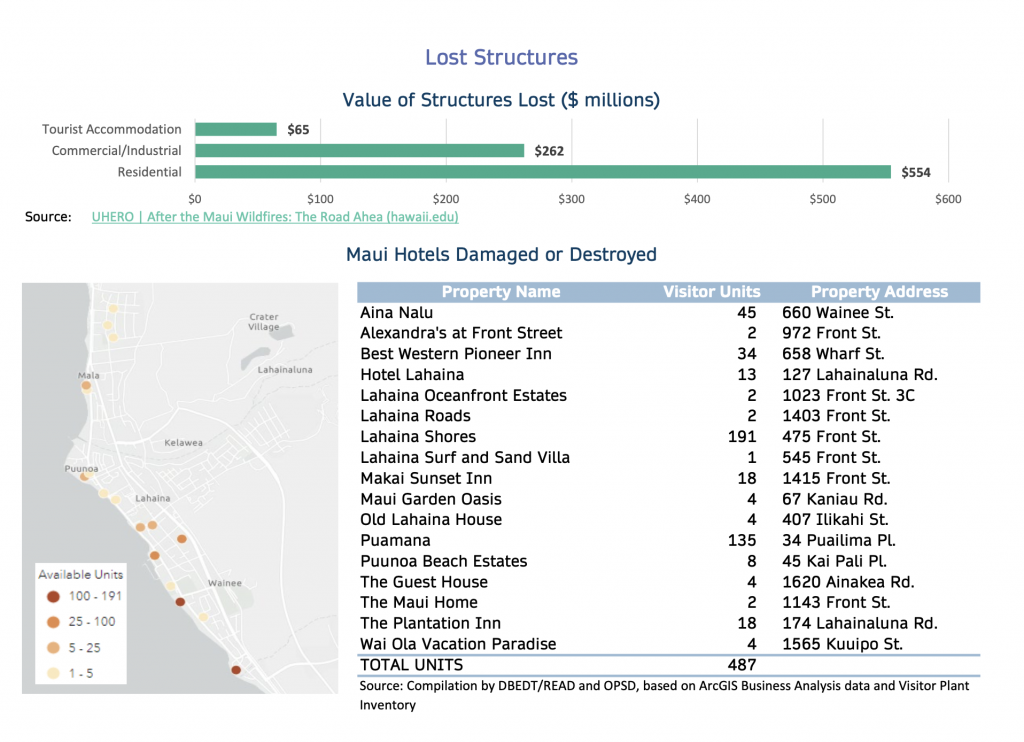DBEDT estimates Maui wildfire impacts on economic recovery

The Department of Business, Economic Development and Tourism released its third quarter 2023 Statistical and Economic Report. Compared with its second quarter forecast issued on June 1, DBEDT revised its economic growth projections for 2023 and 2024 downward, from 1.8% to 1.1% for 2023 and from 2% to 1.5% for 2024. The revisions are mainly due to the Lahaina wildfire tragedy on Aug. 8, 2023 and related impacts.
Economic Impact of the Maui Wildfire
The Maui wildfire took the lives of 115 people and destroyed more than 2,200 homes. The disaster area had more than 800 business establishments with about 7,000 employees. The daily total business revenue of those establishments is estimated to be $2.7 million a day.
A total of 88 transpacific flights were canceled in August, representing 23,083 air seats. The passenger count to Kahului Airport decreased by more than 70% after the tragedy from 7,000 a day to 2,000 a day. The loss from business closures and visitor expenditures is estimated to be $11 million a day on Maui since Aug. 9, 2023.

“We are working with local communities on an opening plan that is strategic, timely, and sensitive to the concerns of the Lahaina wildfire survivors and businesses of West Maui,” said Governor Green. “In the meantime, all other areas of Maui and the rest of Hawai‘i are safe and open to visitors, and we continue to welcome and encourage respectful travel to our beautiful state, which will support our local economy and help speed the recovery of those who have already suffered so much.”
According to US Census Bureau data, 50% of the Lahaina homes were renter- occupied and the average monthly rent is estimated to be $1,700 a month. The rental income loss is about $2 million a month.
Initial unemployment claims jumped from an average of 130 cases per week before the wildfire to 865 cases in the first week after the fire, to 4,449 cases in the second week after the fire, and to 2,705 cases the third week after the fire.
Hawai‘i Economic Recovery Had Been Strong Through July
According to data from the U.S. Bureau of Economic Analysis, Hawai‘i’s economy, as measured by real gross domestic product (GDP), recovered to 97% in the first quarter of 2023 compared to the same period in 2019. During the first seven months of 2023, the labor force (not seasonally adjusted data) recovered to 98.8% of the comparable 2019 level. The number of people employed recovered to 98.5% of the 2019 level, with the non-agriculture payroll job count recovering to 96.1% of the 2019 level during the same seven-month period. The unemployment rate (not seasonally adjusted) averaged 2.9% during the first seven months of 2023, just 0.2 percentage points higher than the same period in 2019.
Hawai‘i’s consumer inflation, as measured by the Honolulu Consumer Price Index for Urban Consumers, averaged 3.1% during the first seven months of 2023, higher than the 1.8% experienced during the same period in 2019, but much lower than the national level of 4.6%.
Year-to-date through July 2023, visitor arrivals recovered to 95.6% of the 2019 level while total visitor expenditures were 21.6% higher than the same seven months of 2019.
As a leading economic indicator, the total value of building permits issued during the first seven months of 2023 increased by 17.1% from the same period a year ago. The permit value for additions and alterations increased by 55.1%, the value of residential permits increased by 0.6%, while the value of commercial and industrial permits decreased by 21.1% during the same period.
As a comprehensive measure of economic activity, state general excise tax collections increased by 8% during the first seven months of calendar year 2023. July 2023 was the 28th consecutive month of positive general excise tax growth.
National Economic Conditions
According to the most recent (August 2023) economic projections by the top 50 economic forecasting organizations published in Blue Chip Economic Indicators, US economic growth in 2023 is expected to be 2% and 0.8% in 2024. These growth rates were much better than the expectations at the beginning of the year when economists projected 0.5% economic growth for the nation for 2023.
After seven interest rate hikes in 2022, the Federal Reserve increased interest rates for the fourth time in 2023 on July 26. US consumer inflation declined to 3.2% in July 2023 from 9.1% in June 2022. Fifty-eight percent of the economists in the Blue Chip Economic Forecasting panel believe that the Federal Reserve will not raise rates again this year.
Instead of a recession, most economists believe that the US economy will experience a slowdown toward the end of 2023 and during the first quarter of 2024.
Areas of Concern
The closure of businesses in West Maui and the decrease in visitor arrivals – not only to Maui, but also to other islands across the state – will negatively affect the state’s economic recovery. The reconstruction of Lahaina will take years to complete.
Hawai‘i has lost population for several years in a row. It is reasonable to expect more people to move out of state due to business employment consolidation and relocation.
Due to high interest and mortgage rates, the number of new residential units authorized decreased by 18.8% during the first half of 2023 as compared with the same period a year ago. The number of existing home sales decreased by 35.3% during the first half of 2023.
The shortage of labor remains a challenge for Hawai‘i’s economy. Job vacancies remained high during the first half of 2023 with an average of 13,000 positions unfilled per month. By comparison, the average of monthly vacancies in 2019 was 7,500.
Bankruptcy filings are again an issue. After four years of consecutive declines, bankruptcy filings increased by 13.5% during the first seven months of 2023.
Forecasting Results
In the current report, DBEDT predicts that the economic growth rate for Hawai‘i, as measured by the percentage change in real GDP, will increase by 1.1% in 2023 from 2022. In 2024, economic growth is expected to reach 1.5% for the state. In 2025 and 2026, economic growth for Hawai‘i is expected to exceed 2.0% due to the expectation that reconstruction activities on Maui will begin.
Visitor arrivals are projected to be 9.8 million in 2023, lower than the number projected in the previous quarter. Statewide visitor arrivals are expected to decrease significantly in August (visitor statistics will be available by the end of September) and remain flat in September, October and November, before seeing growth again in December.
Visitor growth from both the domestic market and international markets will be seen on O‘ahu. The neighbor islands, especially Maui, will see fewer visitors.
According to the current airlines schedule, Delta Airlines will resume its Tokyo to Honolulu flights in October 2023. All Nippon Airways plans to increase flights from Tokyo to Honolulu during the same month. Hawaiian Airlines plans to increase flights from Tokyo to Honolulu in November and resume its service from Tokyo to Kona in October 2023. Total air seats from Japan are expected to increase by 69.9% during the next three months (September to November) while total scheduled air seats from all sources are expected to increase by 5.6% during the next three months.
Visitor arrivals are projected to increase to more than 10 million from 2024 and a full recovery now is projected to be in 2026. Visitor spending is projected to be $21.2 billion in 2023 and is expected to increase to $23.6 billion by 2026.
Non-agriculture payroll jobs are forecast to increase by 1.8% in 2023, lower than the 3.4% projected in the previous quarter. The payroll job counts will increase by 1.9% in 2024, 1.7% in 2025, and 1.5% in 2026. For the current forecasting period (up to 2026), non-agriculture payroll jobs will recover to the pre-pandemic (2019) level by 2026.
The state unemployment rate is expected to be at 3% in 2023 and will improve to 2.7% in 2024, 2.5% in 2025, and 2.3% in 2026. During the first seven months of 2023, the average unemployment rate was at 2.9%.
Personal income is expected to grow by 2.7% in 2023, lower than the projection made in the previous quarter. With federal and state government assistance to the Maui residents who lost their jobs, personal income is expected to decrease less than business revenues.
As measured by the Honolulu Consumer Price Index for Urban Consumers, inflation is expected to be 2.8% in 2023, still lower than the projected US consumer inflation rate of 4% for the same year. Hawai‘i consumer inflation is expected to decrease to 2.3% by 2026.
Statement of DBEDT Director James Kunane Tokioka
The Maui wildfires impacted not only West Maui, but our entire state and the lives of our residents in many ways and have affected our economic recovery from the COVID-19 pandemic. The reconstruction of Lahaina will be a long-term process. DBEDT will continue working with the people of Lahaina and other government agencies at the federal, state, and county levels, as well as with private organizations, to provide help to Maui residents and businesses during this difficult time.
To provide the necessary data and to monitor the state economic recovery and Maui reconstruction process, our research team at DBEDT has created a webpage with information updated on a weekly basis. The data may be accessed via the following LINK.













_1768613517521.webp)


